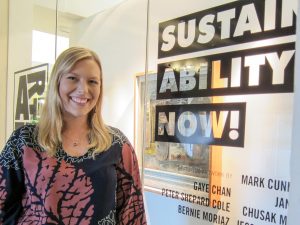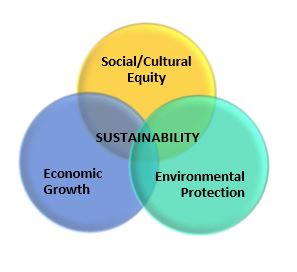The economics of sustainability: Saving taxpayer dollars — and the planet
Posted on Jul 25, 2018 in Featured, MainFor Danielle Bass, the state’s new sustainability coordinator, less can definitely mean more if it helps save the planet — and taxpayer dollars. Less waste. More awareness. More coordination and connecting the dots across the community. “The practice of sustainability comes down to a balance of three things: planet, people and prosperity — the three pillars that define sustainability, according to the United Nations’ 2030 Agenda for Sustainable Development,” she explained.
Bass, who works out of the state’s Office of Planning, is responsible for assisting the state with comprehensively implementing Hawai‘i’s sustainability goals and policies, while serving as a liaison between government agencies as well as private and non-profit organizations. This includes helping build awareness of ‘Aina Pono, the state’s farm-to-school initiative; encouraging more sustainable procurement practices for state departments; and finding ways to monitor our daily experiences to turn wasteful habits into positive, Earth-friendly practices.
Over the past year, Bass also participated in national delegations representing the state’s sustainability interests, and is the state’s representative on the Sustainable Purchasing Leadership Council’s national cohort to encourage sustainable purchasing and procurement for governments and corporations. Bass is working with the ‘Aina Pono Hawai‘i farm-to-school initiative and the state’s Procurement office to develop best practices in sustainable procurement strategies.
“We actually did a ‘dumpster dive’ at the State Office Tower with the support of the Department of Accounting and General Services custodians to educate the building’s users,” said Bass. “We asked, ‘What did we throw away? What could be composted?’” Bass is coordinating with the state’s Energy Office to begin using a sustainability measurement platform called Arc Skoru to help the state’s LEED building users improve their energy and water efficiencies, sustainable practices and human health.
The State Office Tower will be the first building in Hawai‘i to use the system. This state-of-the-art digital platform will start measuring performance, make improvements and benchmark the building against itself to conserve energy and water, monitor air quality, make energy-wise decisions in transportation and improve the human experience to develop the building’s sustainability framework for the future.
While Governor Ige’s Sustainable Hawai‘i initiative sets goals for protecting the state’s natural resources, promoting clean energy and increasing local food production, Bass hopes this newly developed state sustainability program in the Office of Planning will lead to improved practices across sectors. “We actually have a mandate for sustainability in the Hawai‘i State Plan and we have many sustainability-related targets set in law. We also have a 2050 Sustainability Plan that’s very broad and needs updating,” she said. “We’ve made progress in recent years to develop people’s awareness. Now we need to use real indicators to assess where we are, where we want to be and how we’re going to get there,” she said.
Read more in August Capitol Connection newsletter.

